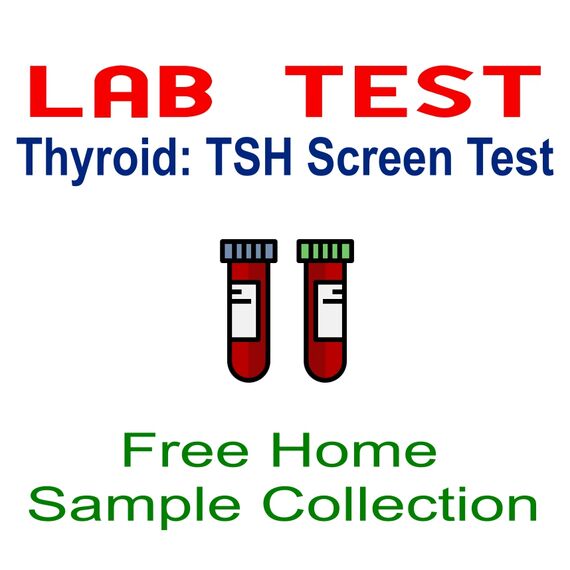This test is aslo known as Thyrotropic Hormone, Thyroid Stimulating Hormone Test, Thyrotropin Test, TSH test, Thyroid Test, TSH Screen Test.
TSH is a hormone produced by the pituitary gland that regulates the production of thyroid hormones by the thyroid gland.
TSH Screen Test measures the TSH level in your blood to assess if your thyroid gland is functioning normally.
The TSH level is tightly controlled by the levels of other thyroid hormones in your blood. Hypothyroidism — high TSH levels — may indicate your thyroid is underactive and needs more stimulation. Low levels, or hyperthyroidism, may mean it’s overactive and needs less stimulation. About 5% of American adults have hypothyroidism, and slightly more than 1% have hyperthyroidism.
The pituitary gland, a small structure beneath the brain and beyond the sinus cavities, produces thyroid-stimulating hormone. TSH causes thyroxine and triiodothyronine to be released into the bloodstream by the thyroid gland. These thyroid hormones aid in the regulation of the body's energy usage. This test determines how much TSH is present in the blood.
The feedback mechanism that the body utilizes to maintain consistent quantities of thyroid hormones in the blood includes TSH and its regulatory hormone, thyrotropin releasing hormone, which comes from the hypothalamus. TSH synthesis by the pituitary gland increases as thyroid hormone concentrations fall. TSH stimulates the thyroid gland, a small butterfly-shaped gland that lays flat against the windpipe at the base of the throat, to produce and release T4 and T3. Thyroid production turns on and off to maintain generally steady levels of thyroid hormones in the blood when all three organs are operating regularly.
When the thyroid produces excessive amounts of T4 and T3, the affected person may have hyperthyroidism symptoms such as high heart rate, weight loss, agitation, hand tremors, itchy eyes, and difficulty sleeping. The most prevalent cause of hyperthyroidism is Graves disease. It is a chronic autoimmune condition in which the immune system creates antibodies that mimic TSH, causing the thyroid hormone to be produced in excessive levels. As a result, the pituitary gland may produce less TSH, resulting in a low blood level.
Weight gain, dry skin, constipation, cold intolerance, and weariness are all symptoms of hypothyroidism, a condition in which the thyroid produces fewer thyroid hormones. In the United States, Hashimoto thyroiditis is the most prevalent cause of hypothyroidism.
TSH values, on the other hand, do not necessarily indicate or predict thyroid hormone levels. TSH is produced abnormally in some persons and does not work properly. Despite having normal or modestly increased TSH values, they frequently develop hypothyroidism. Thyroid hormone levels can be high or low in a variety of thyroid illnesses, regardless of the amount of TSH in the blood.
TSH levels may be elevated or lowered in rare cases due to pituitary dysfunction. In addition to pituitary dysfunction, an issue with the hypothalamus can cause hyperthyroidism or hypothyroidism.
Your doctor may recommend for a TSH Screen Test in several conditions to assess thyroid function:
Thyroid Function Evaluation: If a patient exhibits symptoms of thyroid dysfunction, such as fatigue, weight changes, or changes in mood, a TSH test may be ordered as part of a comprehensive thyroid function evaluation.
Monitoring Thyroid Hormone Therapy: For individuals receiving thyroid hormone replacement therapy, a TSH test helps assess the effectiveness of the treatment and ensures that TSH levels are within the target range.
Screening for Thyroid Disorders: In certain populations, such as newborns or pregnant women, a TSH test is used for screening purposes to detect thyroid disorders at an early stage.
If TSH is tested and the result is abnormal, additional thyroid tests may be ordered.

Always follow to the doctors advise.
Specimen collection after fluorescein dye angiography should be delayed for at least 3 days. For patients on hemodialysis, specimen collection should be delayed for 2 weeks.
Dummy Test
Type the specimeny type like blood, urine or any other specimen required.
Sample report in a format
Aucun avis trouvé


